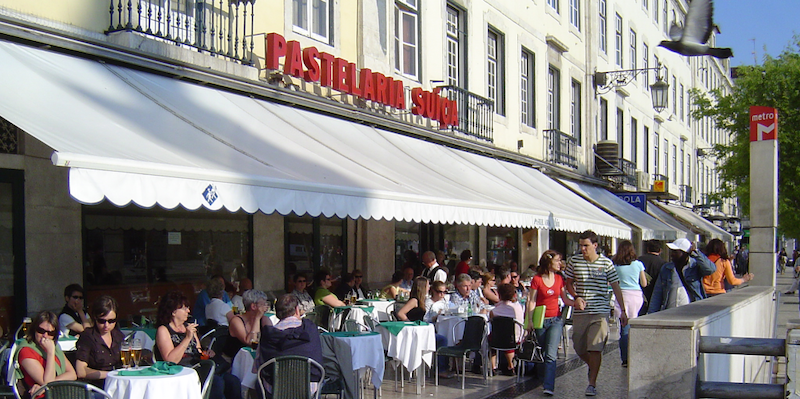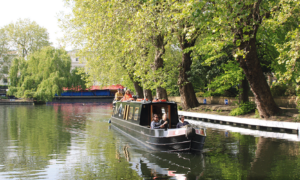Coming from the Middle East, I am used to situations where intense emotions are expressed freely. You will rarely be accused of whining or negativity or pessimism because of how many worries or fears you share. Basically, because everyone whines most of the time, it is acceptable to have your down moments and to involve others in them. It brings people closer and has a sort of a collective cathartic effect.
When I moved to Europe for both my MA and my PhD, I came across some cultural differences, the most prominent of which was the extent to which people find it socially acceptable to express feelings. Indeed, many situations do arise in life when you feel the need to take the lid off your intense emotions regardless of how close you are to the person you are venting to.

If you are experiencing burnout because of your studies or work, you may feel better sharing that with a colleague who is familiar with the cause of this pressure more than with your mom or childhood friend who is oceans and seas away. You may go through a bad breakup and it makes more sense to collapse to your flat mate whom you do not know very well than Skype for hours with your sister, who might be busy or at work.
It just happens that this flatmate is physically there, but your sister is not.
Expats recognize these moments very well. They would have had to let their emotions out a few times with people who are not close to them. These moments make you realize the worst thing about the expat life: loneliness.
Surprisingly, loneliness is one of the least discussed topics in our physical world and one of the most discussed in the virtual one. There are tons of social-media materials, online articles and videos on loneliness.
It is as though we will not look “cool” enough if we admit that we feel lonely, or feeling lonely is something to be ashamed of. There is this pressure to acknowledge that all is going well through Facebook, Instagram and other social-media platforms. Hence, it may seem to the observer that living abroad is all about adventures, new cuisines, and cool nights out with random people.
While it is actually quite exciting to be on the move and discovering new places, this comes at a high cost. You lose your comfort zone and are, consequently, prone to loneliness. It is true that some days we do not feel lonely at all. However, this does not mean that our days are loneliness-free either. As a matter of fact, feeling lonely is not always associated with going through difficult moments.
It could just be that you really want to go to the cinema and find it heavy to go alone or that you are sick of eating alone and would like to try out that new restaurant around the corner with someone. Digital nomads, retired pensioners and newcomers to professional environments feel that kind of loneliness more than foreign students.
What is certain, though, is that all expats feel lonely to one degree or another, especially in the beginning.The good news is that it gets better. However, you need to work a bit on making it better. Isolating yourself or expecting the world to come to your doorstep will not help.
As an expat in Lisbon for the last two years, I have to say that my first few months were the hardest. Over time, a few methods, some of which are quite unusual, made me feel more and more at home in Lisbon.
Here are few of the things which worked for me or I have seen work for others:
Acknowledge your feelings
Pretending that you do not care about it will only work for a while. It is not going to work forever, though. If you feel lonely, stop posting happy pictures of your adventures and stop telling people how magnificent everything is. Sit down and acknowledge your feeling. There is more strength in recognizing vulnerability than in ignoring it.

Hang out in your local pastelaria
What is really amazing about Lisbon is that every neighbourhood, if not every street, has it local pastelaria, the Portuguese version of a cafeteria where locals frequently go for coffee, beer or to watch a game. You will usually find the same people there. It is not likely that you will make friends there if you are not fluent in the language, especially when most customers are elderly people.
However the great thing about going there and trying to chat with your neighbours (who are usually quite friendly) is that you will make your neighbourhood feel homey. There is something heartwarming about recognizing the faces in your street and being able to exchange few words with them as you pass by. They will let you know a lot about your neighbourhood.
In some cases, they might end up saving you.
For example, if you are a non-EU citizen, you need a proof of address to present to SEF to get your residency permit. To obtain proof of address, in some cases, you need two registered citizens from your district to confirm your address in the Junta de Freguesia. It will be much easier to ask people you know for this favour than complete strangers. Even if you urgently need a plumber or you are just curious about where to get fresh fruit from, they will be glad to give you tons of tips. It is just great to still be able to experience this kind of spirit in a capital city.
Sign up at a language school
To be able to hang out with locals, you need some basic Portuguese. Learning the language would give you a better feel of the rhythm of the city and would allow you to decode the cultural nuances to many of the things happening around you. The best way to make new friends is to learn Portuguese in a language school. Avoid private tutoring unless you need it for a specific reason.
In a language school, you will meet expats like yourself who are also open to making friends. I made great friends from the language school I went to especially when they always organized cultural excursions, city tours, and
parties. You get a bit of a social life as an added bonus to learning the language. I went to Saudade Language School which I totally recommend and you can find out more about them here.
Dig out your old hobbies
We all have those old hobbies which have become neglected due to how overwhelming our lives have become. Dig out those hobbies and find an outlet for them in group activities. Lisbon is famous for the ceramic tiles which adorn many of its buildings and the terracotta tableware produced in the Alentejo.
Drawing on these traditions ceramics workshops are popping up across the city offering classes at great prices. My friend made a big circle of friends from all the tango nights she goes to once or twice a week. It is, of course, great to do yoga or join a meditation class, but if you want to meet people, pursue a hobby which encourages group interactions.

Date and/or befriend a local
It is not always easy to make friends with locals. Locals everywhere have their established social circles, lifestyle and comfort zones which they are justified in sticking to. However, if you manage to make friends with a local, you will feel a lot more at home in Lisbon. The same goes for dating a local. This is not to say that expats should obsessively target locals for friendships and romance in a creepy way, but just that one should be open to the possibility.
It worked miracles with two of my expat friends who know so much more about Lisbon than any of us because of their Portuguese partners. They feel more at ease about new experiences in the city and less inhibited by what they do not know. The option is obviously not always available, but if you get a chance, go for it.
Of course, Europe is not one homogenous entity. For example, the way feelings are expressed in France is quite different from Portugal. However what may be common in my experiences in the United Kingdom, France and Portugal is that something remains a bit “awkward” about admitting vulnerability to people who are not family or childhood friends.
Please feel free to share with us your tips for getting over expat loneliness whether in Lisbon or anywhere else in the world. Send them to: [email protected]
It is great to benefit from each other’s experiences and to let others know that they are not alone in this even if they are feeling lonely.

About the author:
Sarah Nagaty is a PhD researcher of cultural studies in Lisbon. She’s lived in Portugal for two years.
As a student of cultural studies, Sarah is drawn to what connects people from different backgrounds to new cultures and places, how they relate to their new surroundings and what kind of activities they could engage with in their new hometowns.
See all of Sarah’s Dispatches posts here.
See Dispatches’s Lisbon story archive here.
Sarah Nagaty has a PhD in cultural studies, She’s lived in Portugal for six years.
As a student of cultural studies, Sarah is drawn to what connects people from different backgrounds to new cultures and places, how they relate to their new surroundings and what kind of activities they could engage with in their new hometowns.















